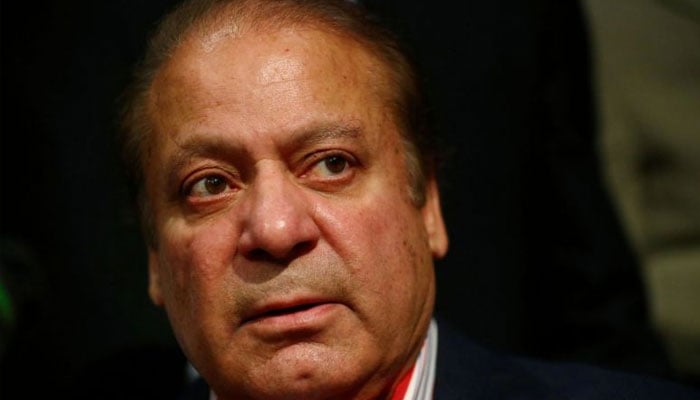Lahore High Court admits PML-N plea against Nawaz Sharif travel conditions
Hearing on the case has been adjourned for Saturday
LAHORE: The Lahore High Court (LHC) on Friday ruled that the PML-N petition for removal of Nawaz Sharif's name from the ECL on a conditional basis was admissible.
The High Court dismissed the NAB and federal government's stance on the matter, adjourning the hearing until tomorrow (Saturday).
The LHC resumed hearing on an application seeking removal of former prime minister Nawaz Sharif’s name from the Exit Control List (ECL).
The high court will conduct a hearing on the matter on Saturday at 11:30 am.
More: Sanjrani asks govt to send Nawaz out
When the proceedings commenced today, the National Accountability Bureau (NAB) and the federal government submitted their replies. The hearing was then put off for an hour to allow the petitioner's counsel to read the responses.
The bench, headed by Justice Ali Baqir Najafi and comprising Justice Sardar Ahmad Naeem, heard the petition.
The government, in its 45-page reply, opposed the plea stating that the petitioner is a convict and that he cannot be allowed to leave the country without a security deposit.
Related: Guess who said this: ‘Let Nawaz die’
Opposition Leader in the National Assembly and Pakistan Muslim League-Nawaz (PML-N) President Shehbaz Sharif had filed the petition on Thursday.
It challenged the government’s conditional one-time permission to Nawaz to travel abroad for medical treatment only after submitting Rs7.5 billion surety bond.
During Thursday’s hearing the court sought a report and para-wise comments from the federal government and the anti-graft body.
Appearing on behalf of the federal government, Additional Attorney General Ishtiaq A Khan objected to the maintainability of the petition and requested that the petition be dismissed for being “non-maintainable”.
He contended that Nawaz should approach the Islamabad High Court (IHC) instead for removal of his name from the ECL, as the federal government had placed his name on the list and the court lacked the jurisdiction to entertain the plea.
Nawaz counsel Amjad Pervez stated that the LHC could hear the petition as the NAB was a federal institution. The counsel argued that the condition of furnishing Rs7.5 billion surety bonds was not based on any provision of law.
He added the government’s condition carried no legal standing as the petitioner had been granted bail in Chaudhry Sugar Mills case by the LHC and his sentence in Al-Azizia reference had been suspended by the IHC.
He contended that Nawaz’s name was placed on the ECL in the wake of pending cases against him. Pervez pointed out that the former prime minister had sent an application to the interior ministry for removal of his name from the ECL but the federal government issued the impugned order on Nov 13, allowing Nawaz to proceed abroad for treatment only after furnishing indemnity bond.
He further said that Nawaz had the fundamental rights under Article 4 & 15 of the Constitution to move freely.
The court then asked the attorney general to tell whether the fine imposed by the government was part of the accountability court verdict.
Responding to the query, the additional attorney general said the federal government had sought surety bond equivalent to the fine imposed by the Islamabad accountability court on Nawaz Sharif.
Shairf's counsel also admitted that the amount of indemnity bond sought by the government was equivalent to the fine imposed on the petitioner in Al-Azizia reference by an accountability court.
The law officer added that the PML-N leader’s sentence was only suspended in Al-Azizia reference and not set aside. The bench observed that the IHC apparently suspended the sentence of the petitioner and not the fine. Justifying the government’s move to seek surety bond, he argued that if a person allowed to travel abroad did not come back, the federal government would be held responsible, as had happened in Pervez Musharraf case.
“Does the ECL ordinance give the Centre authority to give permission for a one-time visit abroad?” asked the court.
To this Pervez said the impugned order of November 13 was not based on any provisions of Exit from Pakistan (Control) Ordinance 1981 and Exit from Pakistan (Control) Rules 2010, empowering the federal government to impose extra conditions for his one-time permission to travel abroad especially after he had been granted bail by two different high courts.
He added Nawaz was seriously ill and the medical board had suggested his treatment abroad. The counsel said the courts were there to take action if the petitioner violated their orders of bail and suspension. The government has no role in the whole matter, he added.
The law officer sought time to verify when asked whether the impugned order of the government for the indemnity bond was a result of any consensus or whether the petitioner had been placed on the ECL on the recommendation of Lahore or Islamabad office of the NAB.
The law officer also sought time to file para-wise comments to the petition, which the bench duly allowed. The bench also asked the law officer to assist it on a legal point as to whether the government had the power to put any condition for removing name from the ECL if there was an order by the court.
-
Security forces gun down 30 terrorists in multiple IBOs in KP: ISPR
-
MQM-P calls for new province in Sindh
-
US report validates Pakistan military edge over India: PM
-
Banned TTP poses serious threat to Pakistan security: UNSC panel
-
CM Afridi clarifies remarks on by-poll after ECP requests army deployment
-
Dubai sees 3.2m Pakistani passengers in 2025 as airport sets new milestone
-
Security forces kill 23 Indian proxy terrorists in KP's Kurram
-
Pakistan to construct island to boost oil exploration: report












